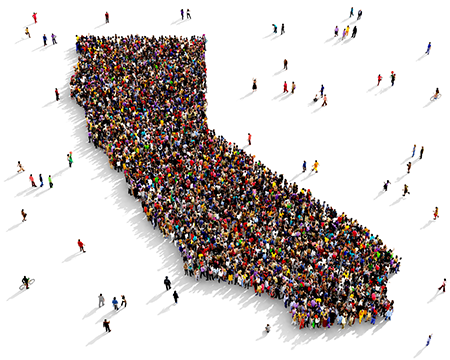California may offer more opportunities for JDs taught entirely online

Image from Shutterstock.com.
If people are open to attending a non-ABA-accredited law school, they may soon have a lot more online choices in California—thanks to a recent rule change by the State Bar of California allowing state-accredited law schools to teach JD programs entirely over the internet.
Trinity Law School and John F. Kennedy University College of Law, two non-ABA-accredited schools that have California accreditation, have filed major change applications to offer 100% online JDs, according to the State Bar of California. Also, Concord Law School, Northwestern California University School of Law and Abraham Lincoln School of Law, all of which are unaccredited, distance-learning schools that already offer online JD programs, are now seeking state accreditation.
“I think there are some reasons schools may want to offer it. It allows them to extend their geographic reach significantly, and that could increase their enrollment,” says Carole Buckner, the former dean of St. Francis School of Law, which is 100% online and registered as a California unaccredited distance-learning law school.
Unlike their non-ABA-accredited counterparts, as of August 2018, ABA-accredited schools can only offer up to one-third of the credits online, although schools can seek variances for more. As is the case with ABA accreditation, site visits are part of the California accreditation process, even if the school is online and doesn’t have much of a site.
“I said they were welcome to come to our administrative office, but it’s literally an executive office with a couple of desks and some law books,” says Martin Pritikin, the dean of Concord Law School at Purdue University Global. “They also want to observe our lectures, and we can make that available.”
For schools seeking state-accreditation, a detailed self-study and inspection is involved to ensure that all the accreditation rules and guidelines are met, according to the state bar.
 Image from Shutterstock.com.
Image from Shutterstock.com.
For state-accredited law schools seeking major change approval to start a new program, they must share plans about why the offering will be effective, the state bar told the ABA Journal. Also, for a major change request to be granted for a California-accredited law school, the school must have a five-year, cumulative bar passage rate of at least 40 percent.
“I do think you might see more California-accredited law schools move into the online space. I don’t expect a ton to crop up, because the reality is it’s not so easy to do online learning well,” Pritikin says.
Concord requires 18 units of experiential learning, and if the work involves negotiation, the law school’s software includes a breakout room function, which professors can visit virtually, according to Pritikin. He teaches an evidence class and does one-on-one video conferences with students, to discuss the motions in limine they wrote.
“There’s a need for a new kind of faculty member, who understands how to have a give-and-take relationship with students through emails and phone calls,” says Myron Steeves, the interim dean at Trinity Law School.
Trinity currently offers nine online JD credits, and if its major change application is approved, it will add 24 online credits annually, with the program fully in place by 2023. Steeves expects that some of the online course work will be taught in real time, while other pieces will involve recorded lectures.
“Personally, I think that online education will be as high-quality as in-person classes,” says Steeves.
But surprisingly, students initially may not embrace online education as much as one would think.
“Many students prefer the online format, but there are quite a few who prefer in-person classes. We expect that as more students come to the law school from distance learning undergraduate programs, more students will be embracing the online approach,” he told the ABA Journal.
California is one of a few states that allows people who didn’t graduate from an ABA-accredited law school to sit for the bar exam. Considering that, the trend of expanding online legal education will probably not grow past California, according to Ellen Murphy, associate dean of strategic initiatives/professor of practice at Wake Forest University School of Law, in North Carolina.
“This is based in part on the profession and the academy’s resistance to change and the continued unfamiliarity with effective online teaching and learning,” she says. “A more likely predictor will be the outcomes data from those ABA-accredited programs that are operating under a hybrid program variance from the ABA.”
See also:
ABAJournal.com: “A better bar exam? Law profs weigh in on whether test accurately measures skills required for law practice”
ABAJournal.com: “Thanks to email error, those taking California bar exam now know essay question topics”
ABAJournal.com: “Law schools with accreditation issues see bar exam improvement, but will they hit 75% pass rate?”
ABAJournal.com: “California Split: 1 year after nation’s largest bar became 2 entities, observers see positive change”
Write a letter to the editor, share a story tip or update, or report an error.


